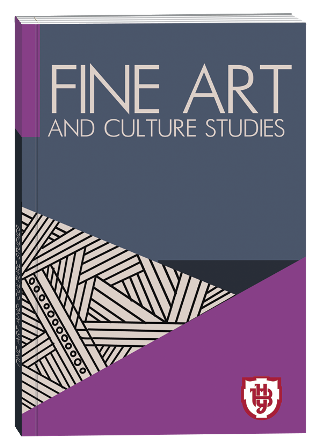GENRE ORIGINS AND WORLDVIEWS OF THE GALICIAN SPIWOHRA
DOI:
https://doi.org/10.32782/facs-2022-1-24Keywords:
musical culture of Galicia, composers-priests, spiwohra, vaudeville, theatrical didacticsAbstract
Galician spiwohra is one of the genres that needs more extensive research in the reconstruction of the holistic panoramic image of the Ukrainian musical and theatrical heritage. Silenced throughout the Soviet period through the authorship of priests - composers and playwrights, the spiwohra needs both a more detailed study in its inseparable connection with various artistic sources, and clarifying the conditions of its return to the modern theater stage. The aim of the article is to find out the main national origins and Western European prototypes of the spiwohra of composerspriests of the second half of the XIX century. and its focus on the educational function among Ukrainians in Galicia The research methodology is reflected in the following tasks: 1) analysis of basic research on the work of composerspriests and the spiwohra in Ukrainian musicology; 2) distinguishing the main national and Western European prototypes of the Ukrainian Galician spiwohra; 3) substantiation of ethical and didactic orientation of the spiwohra; 4) generalization and disclosure of prospects for further research on this topic. Scientific novelty. The article systematizes the origins of the musical-scenic genre of spiwohra, and traces the ways and means of achieving various goals by composers-priests in this genre: the assertion of their national identity; representation of one's own spiritual tradition before representatives of other nations, establishment of cultural and artistic ties between neighboring nations Conclusion. Composers-priests in the spiwohra consistently nurtured the direction of performing arts, the importance of which for national culture is difficult to overestimate and which in modern conditions has not lost its relevance. His influence, despite all the avant-garde and postmodern modifications of modern theater, remains significant in the search for national priorities of performing arts. Undoubtedly, the musical segment of the Galician choir has received an independent artistic "biography" for many decades. Both the folk song, naturally included in the plot of the dramatic action, and the music, which was specially written for individual performances by composers-priests, if considered holistically, systematically, constitute a very voluminous layer of Ukrainian culture.
References
Білинська М. Сидір Воробкевич. Нарис про життя і творчість. Київ : Держвидав образ. мист. і муз. літ. УРСР, 1958. 45 c.
Волинський Й. Музична культура Галичини 60-х років ХІХ ст. Живі сторінки української музики. Київ : Наукова думка, 1965. С. 55-120.
Доридор Г. Український водевіль ХІХ століття : автореф. дис... канд. філол. наук : 10.01.01. Київ, 2000. 18 с.
Забзалюк О. В. Концепції державного устрою на західноукраїнських землях у середині ХІХ – на початку ХХ століття: історико-правовий аспект. Науковий вісник Львівського державного університету внутрішніх справ. 2017. № 4. С. 20‒31.
Загайкевич М. М. М. Вербицький : нарис про життя і творчість. Київ : Держвидав образ. мист. і муз. літ. УРСР, 1961. 48 с.
Каплієнко-Ілюк Ю.В. Музичне мистецтво Буковини: стильові парадигми композиторської творчості XIX– XXI ст. : дис. … докт. мист-ва : 17.00.03. Одеса, 2021. 391 с.
Кияновська Л. Еволюційні процеси в духовній хоровій творчості львівських композиторів сучасності. Молодь і ринок. 2011. № 10. С. 16-20.
Кудрик Б. Огляд історії української церковної музики. Львів : Інститут українознавства ім. І. Крип'якевича НАН України, 1995. 128 с.
Кушлик Н. І. Музично-просвітницька діяльність о. Порфирія Бажанського в контексті соціокультурної практики греко-католицького духовенства Галичини в ХІХ - початку ХХ століття : дис. канд. мист-ва : 17.00.01. Львів, 2007. 232 с.
Кушлик Н. Представники греко-католицького духовенства в національнокультурному відродженні Галичини ХІХ – поч. ХХ ст. (історикокультурологічний аспект). Вісник Прикарпатського університету. Мистецтвознавство. Івано-Франківськ, 2006. Вип. ІХ. С. 39-48.
Лисько З. Піонери музичного мистецтва в Галичині. Львів-Нью-Йорк, 1994. 125 с.
Лугова Т. Український вертеп: синтактика, семантика, прагматика, динаміка. Одеса : ОНПУ, 2006. 465 с.
Лужницький Г. Про трьох мистців українського театру. Наше життя. Нью-Йорк, 1986, ч. 12, грудень. С. 7‒9.
Людкевич С. Віктор Матюк. С. Людкевич. Дослідження, статті, рецензії, виступи / упор. З. Штундер. Львів : Вид-во М. Коць, 1999. Том I. С. 78-84.
Новакович М. Галицька музика габсбурзької доби: у пошуках української ідентичності. Львів: Видавець Т. Тетюк, 2019. 376 с.
Петрусь У. Матеріали до нотографії М. Вербицького. М. Загайкевич. Михайло Вербицький. Сторінки життя і творчості. Львів : Місіонер, 1998. С. 110-140.
Франко Іван. Русько-український театр (Історичні обриси). Іван Франко. Твори в двадцяти томах, т. XVI. Літературно-критичні статті. ред кол. О.Є. Корнійчук, О.Є. Білецький, П.С. Козланюк. Київ : Держлітвидав, 1955. С. 209–245.
Хороб С. Генеза і шляхи розвитку української релігійної драми. С. Хороб. Українська драматургія: крізь виміри часу. Івано-Франківськ : Лілея-НВ, 1999. С. 160‒170.
Чарнецький С. Театр. Історія української культури. Заг. ред. І. Крип’якевича. 4-те вид., стереотип. Київ : Либідь, 2002. 656 с. URL : http://litopys.org.ua/krypcult/krcult50.htm (08.02.2022).
Шамрай А. «Наталка-Полтавка» І. Котляревського. Київ : Мистецтво, 1955. 76 с.







